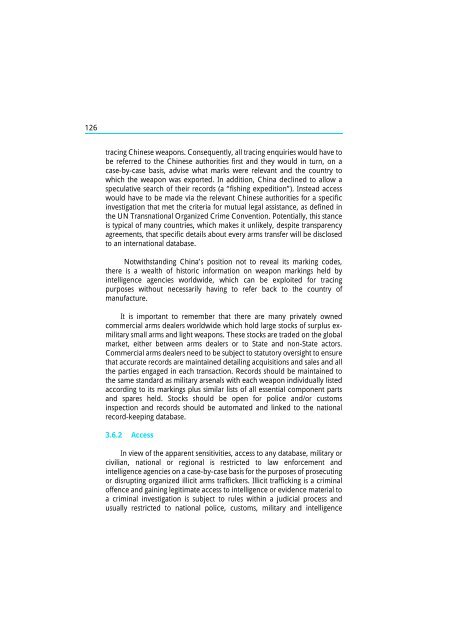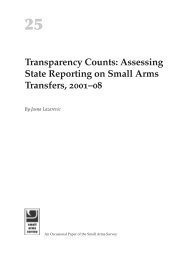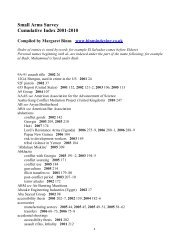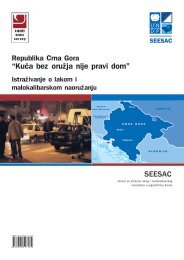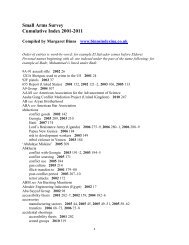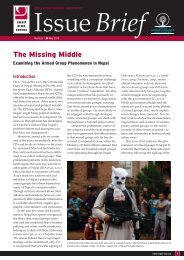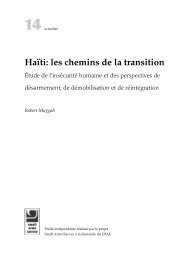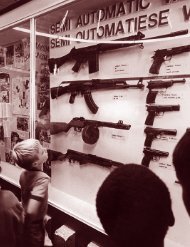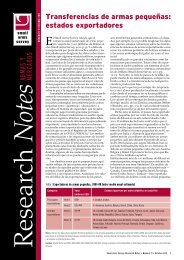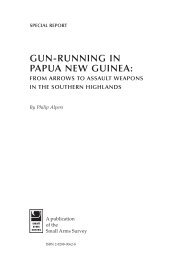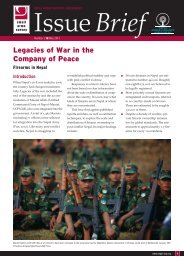The Scope and Implications of a Tracing Mechanism for Small Arms ...
The Scope and Implications of a Tracing Mechanism for Small Arms ...
The Scope and Implications of a Tracing Mechanism for Small Arms ...
Create successful ePaper yourself
Turn your PDF publications into a flip-book with our unique Google optimized e-Paper software.
126<br />
tracing Chinese weapons. Consequently, all tracing enquiries would have to<br />
be referred to the Chinese authorities first <strong>and</strong> they would in turn, on a<br />
case-by-case basis, advise what marks were relevant <strong>and</strong> the country to<br />
which the weapon was exported. In addition, China declined to allow a<br />
speculative search <strong>of</strong> their records (a “fishing expedition”). Instead access<br />
would have to be made via the relevant Chinese authorities <strong>for</strong> a specific<br />
investigation that met the criteria <strong>for</strong> mutual legal assistance, as defined in<br />
the UN Transnational Organized Crime Convention. Potentially, this stance<br />
is typical <strong>of</strong> many countries, which makes it unlikely, despite transparency<br />
agreements, that specific details about every arms transfer will be disclosed<br />
to an international database.<br />
Notwithst<strong>and</strong>ing China’s position not to reveal its marking codes,<br />
there is a wealth <strong>of</strong> historic in<strong>for</strong>mation on weapon markings held by<br />
intelligence agencies worldwide, which can be exploited <strong>for</strong> tracing<br />
purposes without necessarily having to refer back to the country <strong>of</strong><br />
manufacture.<br />
It is important to remember that there are many privately owned<br />
commercial arms dealers worldwide which hold large stocks <strong>of</strong> surplus exmilitary<br />
small arms <strong>and</strong> light weapons. <strong>The</strong>se stocks are traded on the global<br />
market, either between arms dealers or to State <strong>and</strong> non-State actors.<br />
Commercial arms dealers need to be subject to statutory oversight to ensure<br />
that accurate records are maintained detailing acquisitions <strong>and</strong> sales <strong>and</strong> all<br />
the parties engaged in each transaction. Records should be maintained to<br />
the same st<strong>and</strong>ard as military arsenals with each weapon individually listed<br />
according to its markings plus similar lists <strong>of</strong> all essential component parts<br />
<strong>and</strong> spares held. Stocks should be open <strong>for</strong> police <strong>and</strong>/or customs<br />
inspection <strong>and</strong> records should be automated <strong>and</strong> linked to the national<br />
record-keeping database.<br />
3.6.2 Access<br />
In view <strong>of</strong> the apparent sensitivities, access to any database, military or<br />
civilian, national or regional is restricted to law en<strong>for</strong>cement <strong>and</strong><br />
intelligence agencies on a case-by-case basis <strong>for</strong> the purposes <strong>of</strong> prosecuting<br />
or disrupting organized illicit arms traffickers. Illicit trafficking is a criminal<br />
<strong>of</strong>fence <strong>and</strong> gaining legitimate access to intelligence or evidence material to<br />
a criminal investigation is subject to rules within a judicial process <strong>and</strong><br />
usually restricted to national police, customs, military <strong>and</strong> intelligence


